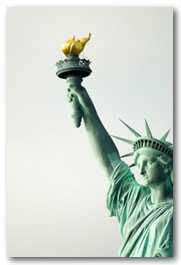The new huddled masses
- FATHER RAYMOND J. DE SOUZA
If there were a law assigning certain jobs by race, it could not be more effectively enforced.
 |
in Phoenix, Ariz On the streets of Phoenix all the landscaping is done by Hispanics. There are restaurants where the entire wait staff is anglo, and the entire kitchen staff Hispanic. Hispanic immigrants, most of them from Mexico, are ubiquitous in the Arizona economy, especially in the service sector.
Many of them are here illegally of course, and the issue of illegal immigration is one that is roiling both Arizona and American politics. Last November, a ballot proposition passed that would bar illegal aliens from receiving in-state tuition rates at public universities, state-financed student aid and publicly funded daycare. It wasn’t even close: 71% voted in favour of Proposition 300.
Cracking down on illegal immigration is popular here, and in many other parts of the southwest. The issue defies easy political categories.
Opposition to illegal immigration is generally thought to be a conservative position, but Proposition 300 was opposed by the Arizona Farm Bureau, and many other business leaders.
“This proposition comes from the frustration over the failure of the federal government to act responsibly and comprehensively on securing our border and reforming the immigration system,” said Kevin Rogers, president of the bureau. “But the fallacy of this measure is the same as when politicians call for penalties on employers who unknowingly hire workers who are not work authorized. … This proposition wants state and school personnel making clerical decisions to become immigration police, without the proper tools.”
Mr. Rogers may be simply defending his interests; Arizona farmers and many other businesses simply could not operate without their illegal immigrant employees. In any case, he is arguing against the tide.
Just this week, the local county sheriff reached an agreement with the federal government to broadly expand the possibility of deportation for illegal immigrants. The new agreement would permit sheriff’s deputies to arrest illegal immigrants in the course of their other work — issuing traffic citations, for example — and turn them over to federal authorities.
The American Catholic experience is overwhelming an immigrant one, and generations of Italians, Poles and Irish whose ancestors bore the brunt of American anti-Catholic bigotry are sympathetic to immigrants in general, besieged immigrants in particular. |
The trend is unmistakable. As many officers of the state as possible — school officials, government contractors, sheriff’s deputies — are going to be empowered, or even mandated, to combat illegal immigration in the course of their principal work.
The issue brings to a head two differing conceptions of justice. On one hand, it is argued that illegals are breaking the law and should not be allowed to benefit from their law-breaking. On the other hand, it is argued that illegals would not come if they were not hired, they contribute to the economy and that justice requires that they not be denied the public benefits provided to state residents. Throw in questions about border security in the era of terrorism, and it is not clear how the issue will play out.
President George W. Bush favours a modified amnesty program for the millions of illegals already here. The last amnesty was in 1986, and he is opposed by the rank-and-file of his own party, which fears that a second amnesty would permanently erode the rule of law. Heated criticism of Mr. Bush’s amnesty program also comes from the labour left, which considers illegal immigrants a threat to unskilled American workers.
The issue also threatens to fracture the growing alliance of evangelical Protestants and conservative Catholics that has been to date very supportive of President Bush on life and family policies. The Catholic leadership in the United States is firmly pro-immigrant, and not much distinction is made between legal and illegal. The American Catholic experience is overwhelming an immigrant one, and generations of Italians, Poles and Irish whose ancestors bore the brunt of American anti-Catholic bigotry are sympathetic to immigrants in general, besieged immigrants in particular. More to the point, immigrants from Mexico are overwhelmingly Catholic and the Catholic Church in the United States is soon to become majority Hispanic in several states. It is unlikely that Church leaders will think they are serving their flock by advocating their expulsion from the country.
The Statue of Liberty in New York harbour holds the book of law aloft as she welcomes the poor, huddled masses. There is no grand statue in the Arizona desert welcoming those who cross the Rio Grande. Indeed, the rule of law is in apparent conflict with the American tradition of welcoming successive waves of immigration.
It is no longer an emerging issue, but rather a soon-to-be dominant one. How exactly it will be resolved is highly uncertain, but things are heating up in the desert southwest.
 This is Meaghen Gonzalez, Editor of CERC. I hope you appreciated this piece. We curate these articles especially for believers like you.
This is Meaghen Gonzalez, Editor of CERC. I hope you appreciated this piece. We curate these articles especially for believers like you.
Please show your appreciation by making a $3 donation. CERC is entirely reader supported.

Acknowledgement
Father Raymond J. de Souza, "The new huddled masses." National Post, (Canada) January 18, 2007.
Reprinted with permission of the National Post and Fr. de Souza.
The Author
Father Raymond J. de Souza is the founding editor of Convivium magazine.
Copyright © 2007 National Post

